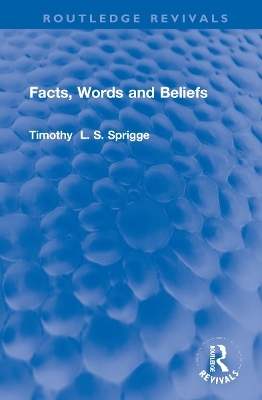
Facts, Words and Beliefs
Seiten
2022
Routledge (Verlag)
978-1-032-25499-9 (ISBN)
Routledge (Verlag)
978-1-032-25499-9 (ISBN)
First published in 1970, Facts, Words and Beliefs is concerned primarily with formulating the question -how can a few stray images or muttered words running through our mind constitute our envisagement of situation perhaps remote in time and place from our present position?
First published in 1970, Facts, Words and Beliefs is concerned primarily with formulating the following question and suggesting the right way of answering it- how can a few stray images or muttered words running through our mind constitute our envisagement of situation perhaps remote in time and place from our present position? From a practical point of view the moments when we envisage the nature of some situation which we believe to exist may not be of any great importance. It would seem that our belief in the existence of such situations lies in some sort of adjustment of our behaviour to them which will be useful if the situations really exist, from the point of view of survival and comfort. The author suggests that these moments of conscious envisagement of such absent situations may be rather a sign of such successful adjustment than a factor in bringing it about, hence of no practical value in themselves. However, if knowledge has any sort of intrinsic value, it must surely lie in those moments when one does consciously envisage some aspects of the world more or less as it really is, and to try to understand the nature of these moments is to try to understand all that is of intrinsic value in knowledge. This book is a must read for scholars and researchers of philosophy.
First published in 1970, Facts, Words and Beliefs is concerned primarily with formulating the following question and suggesting the right way of answering it- how can a few stray images or muttered words running through our mind constitute our envisagement of situation perhaps remote in time and place from our present position? From a practical point of view the moments when we envisage the nature of some situation which we believe to exist may not be of any great importance. It would seem that our belief in the existence of such situations lies in some sort of adjustment of our behaviour to them which will be useful if the situations really exist, from the point of view of survival and comfort. The author suggests that these moments of conscious envisagement of such absent situations may be rather a sign of such successful adjustment than a factor in bringing it about, hence of no practical value in themselves. However, if knowledge has any sort of intrinsic value, it must surely lie in those moments when one does consciously envisage some aspects of the world more or less as it really is, and to try to understand the nature of these moments is to try to understand all that is of intrinsic value in knowledge. This book is a must read for scholars and researchers of philosophy.
Timothy L. S. Sprigge
Preface Part I: Ontological Background 1. Sense-data 2. Universals 3. Facts 4. The Experience of Noticing a Universal 5. Groups Part II: Semiotic Background 6. Pragmatic and Semantic Meaning 7. Types of Reference Part III: Imaging and Believing 8. Acts of Belief and the Intending Relation 9. Simple Imagism 10. Imagist-Activism 11. Imagist-Mentalism 12. Difficulties and Applications of Imagist-Mentalism 13. Merits and Demerits of Imagism Index
| Erscheinungsdatum | 22.04.2022 |
|---|---|
| Reihe/Serie | Routledge Revivals |
| Verlagsort | London |
| Sprache | englisch |
| Maße | 156 x 234 mm |
| Gewicht | 830 g |
| Themenwelt | Geisteswissenschaften ► Philosophie ► Erkenntnistheorie / Wissenschaftstheorie |
| ISBN-10 | 1-032-25499-8 / 1032254998 |
| ISBN-13 | 978-1-032-25499-9 / 9781032254999 |
| Zustand | Neuware |
| Haben Sie eine Frage zum Produkt? |
Mehr entdecken
aus dem Bereich
aus dem Bereich
die Grundlegung der modernen Philosophie
Buch | Softcover (2023)
C.H.Beck (Verlag)
18,00 €
Buch | Softcover (2023)
Reclam, Philipp (Verlag)
7,00 €

![Was heißt Denken?. Vorlesung Wintersemester 1951/52. [Was bedeutet das alles?] - Martin Heidegger](/media/113619842)
